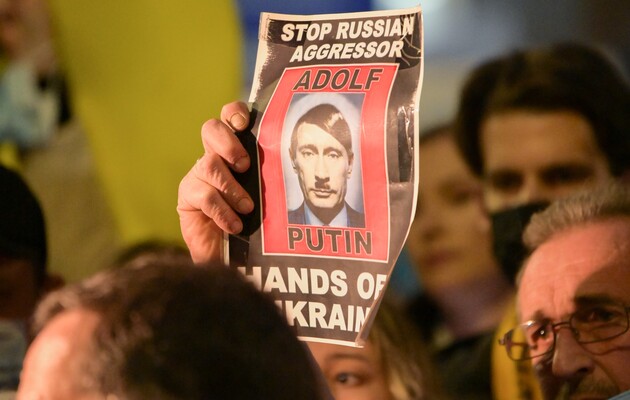And what if the goal of the Russian autocrat was not the capture of Ukraine at all, but its audacious robbery.

The popular opinion now says that Vladimir Putin made a catastrophic mistake. He thought that Russian-speaking Ukrainians would welcome his troops. But no.
He hoped to divide NATO. But the union became even more consolidated. He was convinced that he had made the Russian economy invulnerable to sanctions. But in fact his actions destroyed her. He expected China to come to the rescue. However, Beijing is weighing its stakes. Putin was also confident that the modernized Russian army would turn the Ukrainian army into a mince. And now Ukrainian troops are really crushing Russian forces, at least on some fronts.
This was written by Pulitzer Prize winner Brett Stevens in an article for the New York Times. Putin's miscalculations call into question his strategic judgments and mental state. Who gives him advice at all? Has he lost touch with reality? Is he sick? Mentally ill?
“He is not in control of his emotions. There is obviously something wrong with him, ”warns former US Secretary of State Condoleezza Rice.
The Russian siege of Mariupol and Kharkiv, two Russian-speaking cities that Putin allegedly wanted to “liberate” from Ukrainian oppression, is reminiscent of what the Nazis did to Warsaw or Putin himself to the Chechen city of Grozny.
Several analysts compared it to a cornered rat, which became even more dangerous due to the loss of control over events. They offer to give him a safe way out of the catastrophe he has created. And almost the whole world attacked President Joe Biden for his words in Poland: “For God's sake, this man cannot stay in power.”
The common opinion may well be correct. It fully justifies the Western strategy of supporting Ukraine's defense. The same view tends to conclude that the best outcome of this war is for Putin to find a way out of which he could “save face.” For example, he may be allowed to leave another piece of Ukrainian territory, make a Ukrainian promise to remain a neutral country, or lift some sanctions. But if the popular opinion is wrong? What is it like the West is only playing up to Putin again?
This possibility stems from the powerful memoirs of Charlotte Gall of the New York Times, who covered the Russian siege of Grozny during the first war in Chechnya in the mid-1990s. In the early stages of the war, motivated Chechens knocked out a Russian armored brigade, shocking Moscow. The Russians regrouped and demolished all of Grozny, using artillery and air force. Russia is acting according to the same scenario today.
“When Western military analysts say that Putin cannot win the war with Ukraine, they really mean that he cannot win honestly. And when is Putin playing fair? ” – the article says.
“There is still a whole next stage in Putin's scenario, known as 'Chechen.' When Russian forces established themselves in Chechnya, they destroyed any resistance through arrests and filtration camps, as well as through the expansion of local collaborators, ”Gall said in a statement.
One can imagine for a moment that Putin was never going to conquer all of Ukraine. Its real goal from the very beginning was to capture the energy-rich Ukrainian east, where the largest natural gas deposits in Europe (after Norway) remain. It can be connected with the occupation of Crimea, in the waters near which there are also deposits, with Donetsk and Lugansk with their mines, as well as Putin's desire to control the entire Ukrainian coast. And then the ambitions of the Russian autocrat become clear. He is not so much interested in unifying the Russian-speaking space as in establishing Russian energy dominance.
“Under the guise of an invasion, Putin is committing a huge robbery,” said David Knight Legg, a Canadian energy expert.
As for the rest of Ukraine, which will be left without access to the sea, the West will make sure that this territory becomes an exemplary example of prosperity. In time, a figure like Viktor Orban will become president of Ukraine and begin to imitate Putin's much-loved autocratic political model. If this analysis is correct, then Putin has not miscalculated, as his critics say.
Such an approach may also explain his strategy of destroying civilians. Thus, Moscow is not only trying to compensate for the complete incompetence of its army, but to increase pressure on Zelensky so that he would rather agree with Putin's demands: on territorial concessions and Ukrainian military neutrality. The West is also looking for opportunities to de-escalate. Especially since he convinced himself that crazy Putin is ready to use nuclear weapons. Inside Russia, the war has already benefited the Russian autocrat. Many members of the professional middle class have already begun to flee the country. And these are the people who most actively support the opposition Alexei Navalny. The remnants of the free press were completely eliminated. And maybe it's forever. The humiliation of the Russian army in Ukraine made it possible to carry out purges and eliminate the possibility of a coup from within.
This alternative analysis of Putin's success may be wrong. But, again, in war, in politics and in life, it is always smarter to treat the enemy like a cunning fox, and not a crazy fool.




